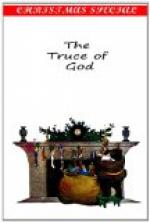Though not apprehensive, Father Omehr was pleased to learn from Linda that the knife had not been poisoned. Gilbert’s eye brightened at the intelligence, though he had not given utterance to his fears—fears they were—for even the young and brave recoil in terror from death, when it assumes a form and hovers near in a detested shape. Having informed the youth that a messenger had been despatched to his father, the priest left Gilbert in charge of the sacristan, and proceeded on his daily errand of mercy through the neighborhood. By men like him, fervent, fearless, faithful, the rude Northern hordes were induced to abandon their idolatry, and embrace the faith of the Church of Rome. These noble missionaries slowly but surely prepared the canvas on which were afterward laid, in colors of enduring brightness, the features of Christian civilization.
When Father Omehr returned, Gilbert was asleep. The sacristan put in his hands a letter from a distinguished prelate, informing him of the nomination of Henry, canon of Verdun, by Henry IV.
“O God, protect Thy holy Church!” exclaimed the missionary, crushing the paper in his excitement. “If the ministers of God become the creatures of the king, despotism and irreligion must inevitably ensue. How long will virtue be accounted a crime? Shall every faithful shepherd be supplanted, to make room for the wolf of lay investiture, the instrument of a lustful tyrant, raised by simony, and upheld by royal favor?”
Gilbert’s light slumber had been broken by the voice of his benefactor. As soon as Father Omehr saw the youth awake, he approached him, and inquired, with great kindness of manner, whether he felt better.
The youth replied in the affirmative.
“I have discovered,” continued the other, “that you have richly deserved this wound. You killed with your own hand the husband of the woman who stabbed you, and though the chance thrust of an affray, it was noted, and communicated to Bertha by an eye-witness, one of the combatants. This is her revenge—but how inadequate to her suffering!”
“It is, indeed,” said Gilbert, replying to the last remark, which had been particularly emphasized. His companion could not conceal the satisfaction with which he hailed this reply, as an omen of regret, and of a right apprehension of his former violence. But the youth was drowsy, and prudence forbade a longer conversation. At the close of the evening service, the lady of Stramen was seen to exchange a few words with her venerable pastor, but she did not enter the cell.
The gorgeous sun of ancient Suabia was beneath the horizon—but Gilbert slept upon his couch; the moon had lit her feebler torch, and walked silently beneath the stars—yet not until midnight did Gilbert awake. All was profoundly still. The dim light of the taper at his bedside revealed only the motionless figure of the sacristan, and the outline of a crucifix hanging against the wall. His eyes involuntarily closed, and in a moment he stood before his father, in the oaken halls of Hers—his retainers were around him—the horses pranced merrily—the bugle sounded—“On to the chase!” was the cry. He opened his eyes—the crucifix became more distinct.




